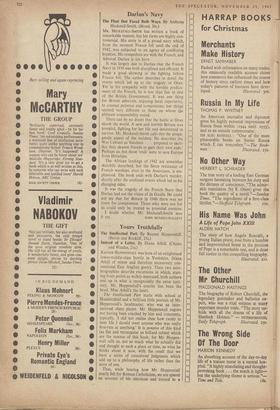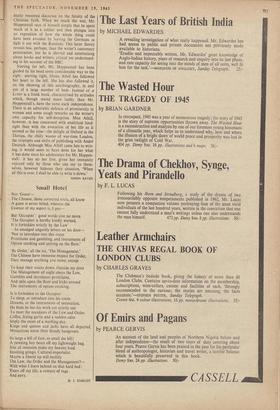Yours Truthfully
The Intellectual Part. By Rayner Heppenstall. (Barrie and Rockliff, 25s.) Instead of a Letter. By Diana Athill. (Chatto and Windus, 21s.) RAYNER HEPPENSTALL was born of an enlightened lower-middle-class family in Yorkshire, Diana Athill of minor and therefore excessively con- ventional East Anglian gentry. Their two auto- biographies describe excursions in which, start- ing from points so widely separated, both authors end up in what is recognisably the same terri- tory. Mr. Heppenstall's courier has been the head, Miss Athill's the heart.
The Intellectual Part starts with school at Huddersfield and a brilliant little portrait of Mr. Heppenstall's headmaster, who was an inter- national chess player. Mr. Heppenstall regrets not having been coached by him and comments, typically, 'I did not realise then how rarely in later life I should meet anyone who was really first-rate at anything.' It is pensees of this kind (as flat and rectangular as billiard tables) which are the essence of this book; for Mr. Heppen- stall tells us, not so much what he actually did and thought at such a place or time, as what he thinks about it now, with the result that we have a series of considered judgments which add up to a philosophy of life rather than the story of one.
Thus, while hearing how Mr. Heppenstall nearly fell for Roman Catholicism, we are spared an account of his emotions and treated to a nicely reasoned discursus on the fatuity of the Christian faith. When we reach the war, Mr. Heppenstall says of himself simply that he spent much of it as a soldier and then plunges into an exposition of how the whole thing could have been avoided by leaving the Germans to fight it out with the Russians. This latter theory reveals less, perhaps, than the writer's customary penetration; but he is shrewd and entertaining about books and writers, critical, yet understand- ing in his account of the BBC.
Starting far left, Mr. Heppenstall has been guided by his head some considerable way to the right : starting right, Diana Athill has followed her heart to the left. She has also followed it, on the showing of this autobiography, in and out of a large number of beds. Instead of a Letter is a frank book, characterised by attitudes which, though stated more lushly than Mr. Heppenstall's, have the same stark independence. There is an admirable defence of promiscuity in women. and some tough remarks on the writer's own capacity for self-deception. Miss Athill, however, is less concerned with analytical hind- sight than with the evocation of her life as it seemed at the time—the delight of Oxford in the Thirties, the chilly wastes of war-time London, the triumphs and shifts of publishing with Andr6 Deutsch. Although Miss Athill came late to writ- ing, it would seem to have done for her what it has done since his adolescence for Mr. Heppen- stall: it has set her free, given her immunity enjoyed only by those who can say to them- selves, however hideous their situation, 'When all this is over, I shall be able to write it down.'
SIMON RAVEN































































 Previous page
Previous page